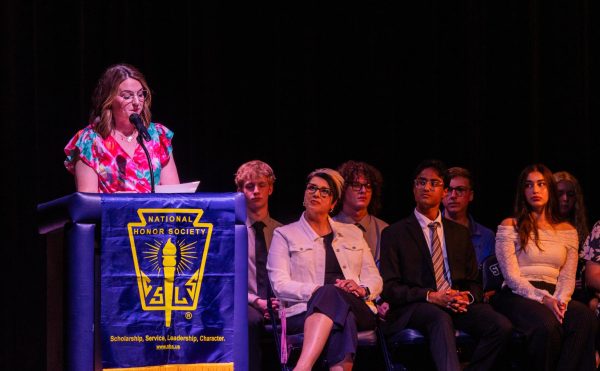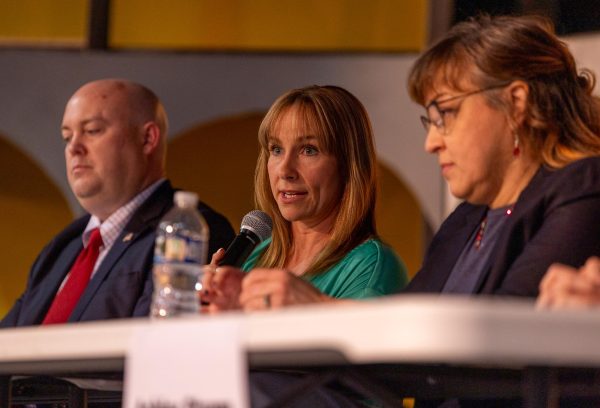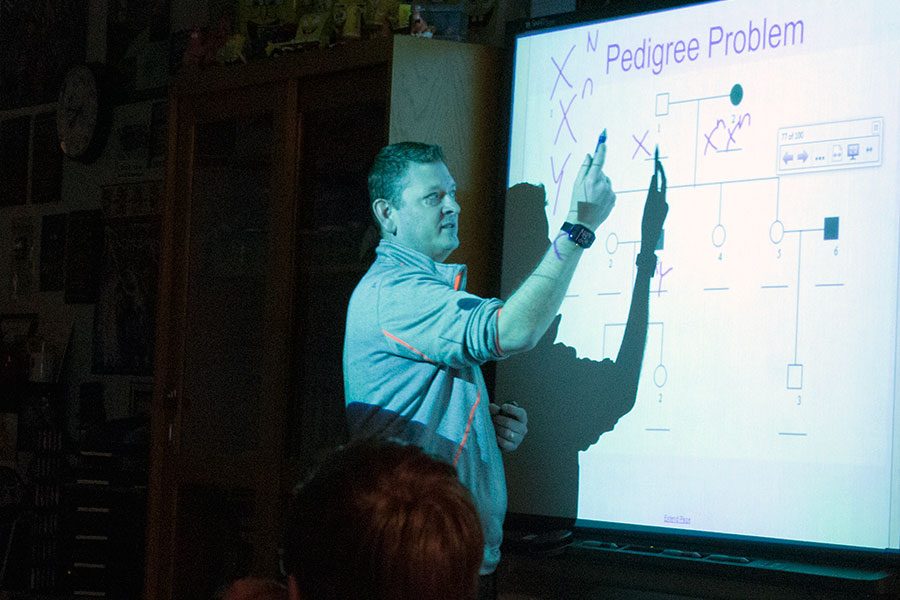A scheduling conflict
This year, and possibly next, the AP test dates will overlap our own finals.
Mr. Patrick Reed teaches his Biology class during first hour. Mr. Reed has voiced his opinion on the district’s decision.
This year, the second week of AP testing will fall onto the same week as the Francis Howell district high schools finals week. Since this scenario has never arisen before, the principals and assistant principals in the area had to find an all-new solution to the challenge.
Administration involved AP teachers and department heads in the decision. After a few meetings and a faculty poll, the buildings came to a consensus: Students taking AP exams on the same day as any of their normal finals would be exempt from the normal finals in favor of their AP tests. Assistant Principal Dr. Luke Lammers cited this decision as a way to slightly minimize the amount of standardized testing students go through in a year.
“I think [this way is] fair because we’ve got a lot of ways students can exempt from finals, there’s EOC scores and ACT scores. Already, students that are in an AP class, if they take the AP exam, they are exempt from the final for that class. We feel like students are assessed enough, students are over-assessed. In modern American schools, there’s this extreme pressure on students in regards to standardized assessments. So there’s seven final exams, there’s the End of Course exam, there’s the ACT exam, that’s a lot of tests. So we feel like it’s okay to have exemptions in place there. If we were exempting them for a field trip, if we were exempting them to just have the test off because we like you, that would be unfair. But we’re exempting them because they are taking a very high level, rigorous, college level exam during that time, that is for one of their classes,” Dr. Lammers said.
Teachers without AP classes who also teach AP students, such as Mr. Patrick Reed, have a problem with the conflicting scheduling.
“A student enrolled in ZoBot is responsible for ZoBot information. I need an opportunity to assess their knowledge at completion. If my final overlaps with an AP exam in another course, then that student can and should take the ZoBot final during make-ups. They are already getting to exempt the final in the AP course, it shouldn’t extend to other classes that aren’t related,” Mr. Reed said. “I do understand their reasoning though, and it appears to be the best solution to a bad problem, all things considered.”
Dr. Lammers concurred that the decision was made to better an unfortunate situation and move responsibility for this off the shoulders of students.
“We just really didn’t want to put students impacted in this in a no-win situation. We didn’t want to put them in the position of choosing between taking a final for their class and taking an AP exam that could potentially save them thousands of dollars in college. We felt like we had to prioritize that while also protecting students from having to make a difficult decision. We felt a little more confident in that, because this is very likely just a one to two year problem. We’re trying to protect students from being overassessed and making sure they didn’t have to make an impossible decision,” Dr. Lammers said.
Mrs. Dena Rulo agreed on Mr.Reed’s point that students should be given the opportunity to take an exam during finals makeups if they so wished.
“[This is] where it gets a little tricky, and again it’s a decision we have to make and hopefully teachers will be understanding as to why students won’t be there. I do feel that if a student misses an exam because of an AP exam, if they want to take that exam to help boost their semester grade, it would be fair to make that an option. But I also feel like the teachers here are professional and caring and understanding enough that they will work with students on an individual basis if there is an issue,” Mrs. Rulo said.
Past the debate on whether the schedule is fair lies the question of how administration will be communicating any changes and who will be most affected by them.
“[I think] students who are taking a large number of AP classes, and therefore AP exams, with several other non-AP but yet still challenging courses (where their final times may be compromised) [are most likely to be affected],” Mr. Reed said.
To the extent of communicating any changes, Dr. Lammers felt confident that the schools would have no problems telling the affected students and teachers what the procedure would be.
“Making sure everybody knows, making sure all of the impacted people are aware [will be the hardest part]. Depending on how many snow days we have (we’ve had one), that has already changed the schedule and which exams are impacted. As that happens, that’s going to change the pool of people impacted. If we have no more snow days, then cool, we know what we’re doing. If we have one more, this happens, if we have another, this happens. We have a grid that’s put together. Communicating it is going to be the major challenge, but we’re up to it, we know how to communicate things. Communicating to the impacted people is going to be the major thing, and staying nimble with cancellations and who we have to communicate to,” Dr. Lammers said.
While this problem may have caused some discourse amongst teachers, many agree it is the best solution to the problem even with its side effects.
Your donation will support the student journalists of Francis Howell Central High School. Your contribution will allow us to purchase equipment and cover our annual website hosting costs. FHCToday.com and our subsequent publications are dedicated to the students by the students. We hope you consider donating to allow us to continue our mission of a connected and well-informed student body.






